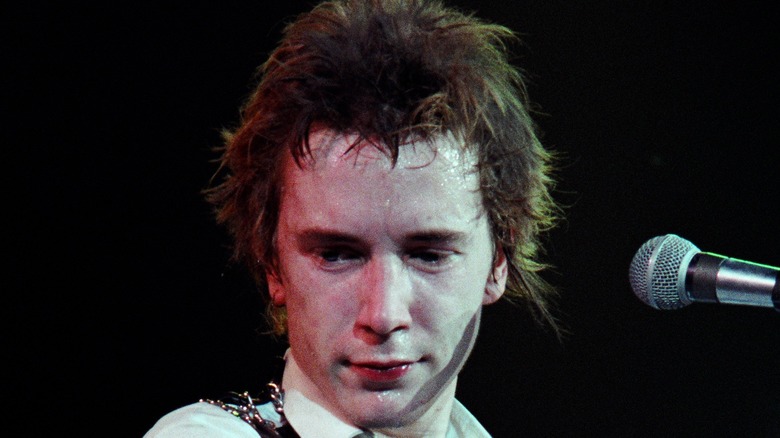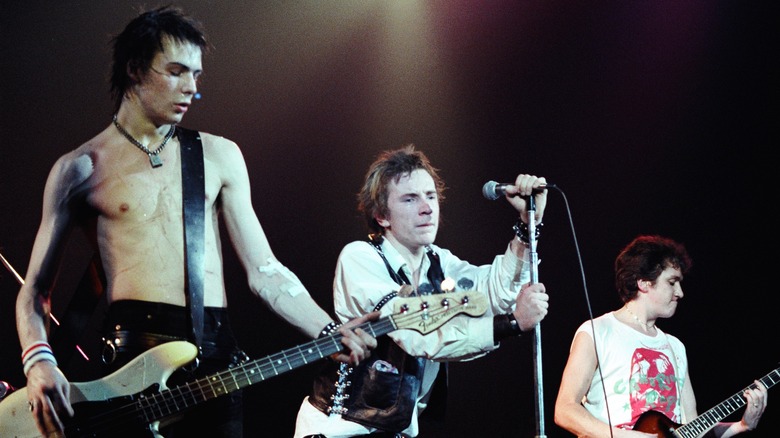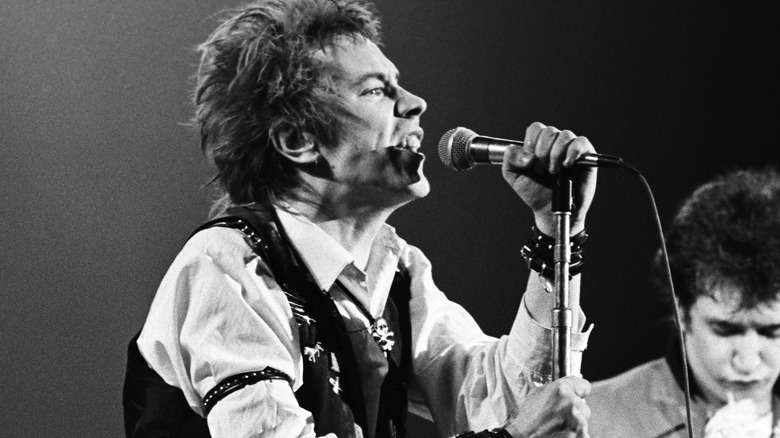The Real Reasons The Sex Pistols Broke Up
"Ever get the feeling you've been cheated?" With those words, the Sex Pistols effectively wrapped up what had been a brief, yet incendiary run as one of the bands that kicked down the door for punk rock in the mid-1970s. They were far from being the most technically proficient band out there, and they wouldn't have had it any other way — they were, after all, proud to be the antithesis to the rock giants of the decade, whom they largely saw as pretentious dinosaurs who had long sold out. They had just about as much fondness for authority as they did for music theory, and prided themselves on their status as musical and social nonconformists. And on that night at the Winterland Ballroom in San Francisco on January 14, 1978, it was all over.
As noted by Radio X, it was clear to frontman John Lydon, aka Johnny Rotten, that the Pistols would be finished once they finished their U.S. tour. During the encore at the Winterland show, the band performed a cover of the Stooges classic "No Fun," one that got sloppier and sloppier as it progressed, with Rotten looking and sounding like he'd rather be somewhere else. Then, after over six uninspired minutes, most of which featured Rotten sitting and staring at the floor while alternately singing, screaming, and mocking the crowd, the singer said that now-immortal line about feeling cheated. The fans at the Winterland probably didn't have any idea of why Rotten felt that way, but as it turns out, there was quite an interesting story behind those comments — and how they played a role in the breakup of the Sex Pistols.
The Pistols' U.S. tour was a disaster from the word 'go'
By the end of 1977, the Sex Pistols were well-established ("notorious" may be the better term) in their home country of England, thanks in no small part to songs such as "Anarchy in the U.K.," "Pretty Vacant," and "God Save the Queen." At that point, manager Malcolm McLaren wanted to introduce his charges to the U.S. market, but instead of taking the Pistols to New York, Los Angeles, or other cities that had a thriving punk scene, he opted to have them play in "non-punk" cities such as Atlanta, Memphis, and San Antonio (via Radio X). McLaren supposedly chose this strategy to avoid the possibility of unwanted publicity in the aforementioned U.S. punk meccas, as well as to potentially shock conservative Southern audiences in the latter group of cities.
Due to delays in securing work permits for the band, the Pistols' first few dates in December 1977 were canceled, leaving the group no choice but to start the tour on January 5, 1978, in Atlanta and wrap it up nine days later at the Winterland Ballroom in San Francisco — not a Southern city, but rather the epicenter of the late '60s flower power movement, and very much in line with McLaren's plans to stir up controversy in non-punk locales. But that was far from the only problem plaguing the Pistols, as bassist Sid Vicious' heroin use was out of control and the band was constantly at each others' throats. According to Far Out Magazine, it didn't help that most of their performances were, quite predictably, a total mess.
Johnny Rotten was disillusioned by everything Sex Pistols
The drug use, poor morale, and lackluster shows were wearing on Johnny Rotten during the Sex Pistols' 1978 U.S. tour, and it showed more than ever at the Winterland. He was visibly disgusted by Sid Vicious' heroin consumption and his consequently poor playing, remarking on stage that "If you can put up with that, you can put up with anything," as quoted by Far Out Magazine. And during the band's "No Fun" cover, where, toward the end, he changed Iggy Pop's original lyrics to speak-sing "this is no fun, no fun, this is no fun at all," he meant every word of it. As he later wrote in his autobiography "Rotten: No Irish, No Blacks, No Dogs," he did feel "cheated" and he saw the whole deal with his band as a "ridiculous farce."
According to Radio X, Rotten may have reached the breaking point after he learned that Malcolm McLaren wanted the band to fly to Brazil after the tour to record an album with "The Great Train Robber" Ronnie Biggs. To him, this was not what the Pistols stood for — it was a tacky scheme that made even less sense than having the band play at redneck bars packed with unappreciative audiences. Making things worse was how guitarist Steve Jones and drummer Paul Cook allegedly took McLaren's side.
Having finally had enough, Rotten flew to New York and announced that the Sex Pistols were done, leaving Jones, Cook, and McLaren (who were all in Brazil as planned) blindsided. As for Vicious, his drug habit had landed him in a New York hospital at the time of the announcement.


